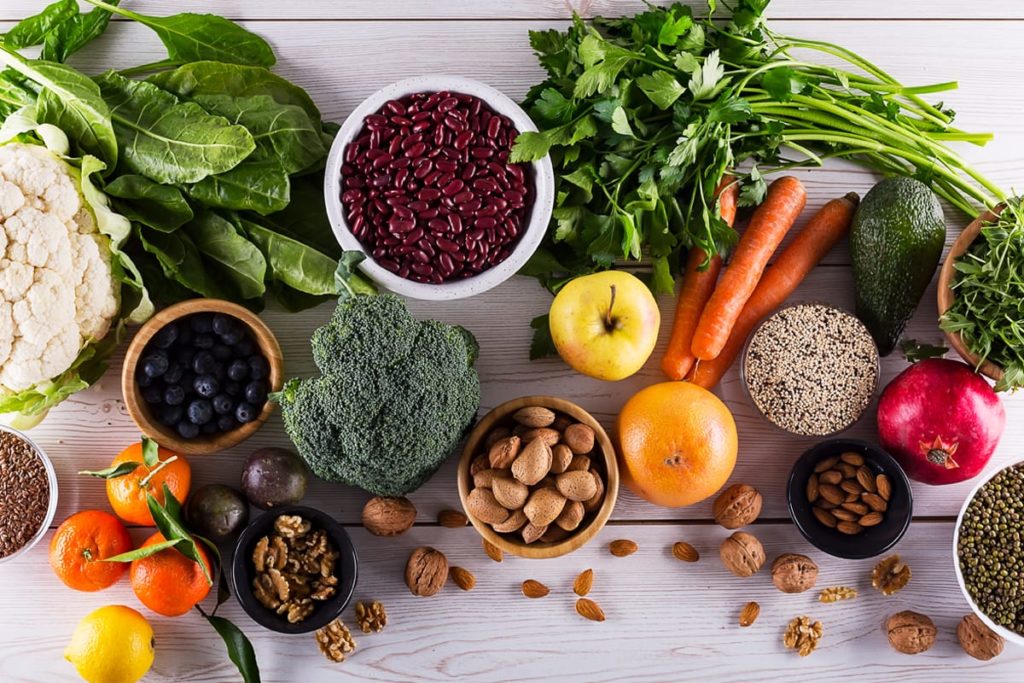
Late winter can be synonymous with weight loss goals, and this year is no exception to the trend. Do you have love handles from your pandemic stay-at-home routine, entertaining yourself with food and creative cooking binges? Has weight loss been a concern for you or a loved one before lockdown, and now it’s tougher than ever to battle? Learn the Ayurvedic approach to weight loss and some of our top tips for managing it at home.
Weight loss diets and the Ayurveda advantage
The latest CDC data suggests that over 71% of Americans are overweight or obese. Obesity is defined as a medical disorder involving a BMI (body mass index) over 30. According to this definition, 25-30 is considered overweight, and 18.5 to 24.9 is a healthy range. Obesity can be caused by genetic, socio-economic & cultural factors, stress, nutrition, lifestyle imbalances, endocrine disruptors and illnesses like hypothyroidism, PCOS or the side-effect of certain medications like antidepressants and steroids. Obesity-related conditions including heart disease, stroke, type 2 diabetes and certain types of cancer are some of the leading causes of preventable, premature death. Adults with obesity are also at heightened risk for severe outcomes from COVID-19.

Common issues with diets
With almost three quarters of the adult population overweight, why aren’t diets working? In 2007, a UCLA study found that diets don’t work, as the majority of people regain the weight they lost – and then some! The study concluded that diets are not effective in treating obesity, and that evidence suggests repeatedly losing and gaining weight is linked to cardiovascular disease, stroke, diabetes and altered immune function. Some diets favor certain nutrients over others, and may not be sustainable, or could even cause nutritional deficiencies. The best diet examples incorporate nutrition, exercise, stress relief and a healthier lifestyle.
The four keys to Ayurveda’s weight loss success
Ayurveda’s approach to diet is unlike diet trends and fads, which promote a rigid diet that may not be suitable for everyone, and is often difficult to maintain. Ayurveda is a form of complementary and alternative medicine that originated over 5,000 years ago in present-day India. There are four keys to what makes it successful with weight loss.
- Natural – Ayurveda promotes sustainable, natural changes in lifestyle, nutrition and sleep for total mind-body-spirit wellness.
- Personalized – It meets you where you are and fosters self-awareness by emphasizing that one size doesn’t fit all. Personalized solutions are provided to all three pillars and recommended therapies.
- Health Prevention – Ayurveda doesn’t treat a disease; it empowers an individual. In Ayurvedic consultations, you discuss your personal health goals and family history. Your practitioner utilizes a holistic management of imbalances, ranging from hypothyroidism to obesity, to anxiety and depression.
- Stress Targeting – Ayurveda focuses on stress reduction with yoga, meditation, palliative herbs and cleansing therapies.
Ayurveda's approach to weight loss
Weight management in Ayurveda is a part of a larger goal of disease prevention and management. Ayurveda takes a holistic, sustainable and most importantly, individualized approach. For example, fasting for a short duration may be recommended for some individuals or could be contraindicated in some, even though they may both be overweight. A comprehensive Ayurvedic consultation factors in a person’s state of health, genetic and social history, emotional and mental wellbeing, current imbalances and lifestyle. It addresses the root cause of weight gain and allied conditions, and recommends a combination of short term and long term changes in diet and lifestyle. This is Ayurveda’s edge in helping people lose weight and keep it off.
Ayurveda has targeted weight loss for thousands of years and is successful because of its comprehensiveness. Obesity is called Sthoulyam in Ayurveda. According to Ayurveda, there is an imbalance in digestive fire (Agni) and toxins (Ama) which disturbs the metabolism of fatty tissue (Medo Dhatu). Ama also blocks the channels of body tissues causing a vitiation of Vata Dosha, which is the energy principle of air and ether elements. This imbalanced Vata disrupts digestive fire and increases appetite. This, coupled with improper fat metabolism, leads to obesity. Excess intake of sweet, oily and cold food causes vitiation of Kapha Dosha, the energy principle of water and earth elements, which also leads to fat deposition. Ayurveda recommendations for weight loss correct these faulty metabolic factors to maintain optimum body weight.
Ten Ayurvedic tips for weight loss
1. Prioritize health to get to an optimal weight
Six in ten Americans have lifestyle based chronic disorders like obesity, type 2 diabetes, cardiac issues, joint, kidney and lung disorders and certain orders of cancer according to the CDC.
The first step for weight loss is to make health a priority. What are your goals for better health? How do you take care of yourself? As you focus on your health with dietary and lifestyle changes, a steady, sustainable weight loss is a natural byproduct!

2. Make sure to get enough sleep
Research has shown that poor sleep leads to weight gain. Ensure you’re getting enough sleep by avoiding late nights. It’s also important to avoid daytime sleep, which aggravates Kapha Dosha and contributes to weight gain.
3. Hydrate properly
Just like solid foods, Ayurveda has a variety of recommendations for how, when and with what you should hydrate.
- Have one to two glasses of warm water with lemon and honey in the morning on an empty stomach.
- Sip lukewarm water through the day, a natural detoxifier.
- Try herbal teas like ginger or CCF tea (cumin, coriander and fennel) or tea spiced with cinnamon, cardamom, ginger and Tulsi (holy basil).
- Sip warm water about 45min before meals to ignite Agni and combat pseudo-hunger. Avoid drinking water with your meal. If you’re thirsty, sip warm water or ginger tea. Don’t drink water immediately after a meal. Wait for about half an hour.
- Cut down on beverages like caffeinated tea, coffee and aerated drinks. Have herbal tea or warm water instead.
4. Cultivate new rituals for eating
How you eat is just as important as what you eat. Adopt as many of the following rituals as you can.
- Honor natural rhythms by following a daily and seasonal regimen. For instance, when you eat local, organic, seasonal root vegetables in the fall and berries and greens in spring, you are in alignment with nature.
- Follow regular meal timings and avoid snacking. Of the following: how much, when and what you should eat, a regular pattern of eating is most important. Vaidya. Jayarajan Kodikannath, our Chief Ayurvedic Consultant, once supported the health of a large company of employees starting just with this one change in their lifestyle! Have three regular meals. Plan ahead; stay satiated with nutrient-rich food; if you have to, reach for a healthy snack like a piece of fruit or roasted seeds.
- Eat in moderation. Control your portion sizes by having a cupped hand measure of food. Don’t fill your stomach to the limit – you can stop before the full feeling hits. Ayurveda advises that a third of your stomach should be filled with solid, a third with liquid and the rest should be empty to facilitate digestion and avoid unwanted fat deposition.
- Sit down to eat in a peaceful setting. Don’t eat on the go or gulp your food. Take the time to sit down to eat, and avoid eating while glued to the media or TV. If you can, avoid other distractions, including stress. Don’t eat while anxious or in the midst of difficult conversations.
- Cleanse periodically. Cleansing uproots toxins and helps address many ailments, preventing their recurrence. Generally it’s optimal to cleanse in spring and fall, which is when our biannual cleanse programs occur such as the upcoming 21-Day Spring Cleanse. You can talk to your practitioner for more specific guidance on how to cleanse.
- Take a short walk after your meal.

5. Choose foods that support weight loss and avoid foods that block it
Ayurveda has specific dietary guidelines for different types of Ayurvedic constitution and imbalances. You can follow personalized advice after an Ayurvedic assessment, though below are some general tips for all constitutions.
- Try a Kapha-pacifying diet by favoring warm, light, bitter, pungent (spicy) and astringent tastes. Limit heavy foods, oils, sweet, sour and salty tastes.
- Wheat and barley are specifically mentioned in Ayurveda as grains that aid natural weight loss. Steel-cut oats, millets, quinoa, old rice and amaranth are other options.
- Enjoy high fiber vegetables like cabbage, broccoli, carrots and banana stem, adequately spiced. Leafy greens, bitter gourd, radish, lentils and legumes are great. Try a bowl of clear soup with veggies!
- Have fruits in moderation like apples, berries, pears, and limited quantities of nuts and seeds.
- Favor warming spices like black pepper, dried ginger, turmeric, cumin, cardamom and cinnamon.
- Opt for whole foods as much as possible and avoid sweets, junk, fried, cold, frozen and canned foods.
- You may try food and spices that have a heating potency with scraping qualities, such as ginger, garlic, pepper and honey. However, it’s important to be mindful of your imbalances so as not to cause any aggravation to your system. For instance, pungent food could aggravate Pitta Dosha (energy principle of fire and water).
- If you consume dairy, replace yogurt with churned buttermilk, which aids tissue level fat metabolism, and add roasted cumin, curry leaves and Himalayan salt to taste.
6. Break a sweat
A balanced lifestyle involves daily exercise, breathwork and meditation. According to Ayurveda, exercise brings lightness, ability to work and a good appetite. It gets rid of excess fat, tones and shapes the muscles and firms up the body. Regular exercise also helps with other health conditions, improves mood, digestion, sleep and generally boosts energy.
Your type of workout is your prerogative – just be sure you do it daily, and make sure to stretch before and cool down afterwards.

7. Reduce stress
It’s easy to focus on diet and exercise, the long-touted cures to weight. They are absolutely important, though in today’s world, we need to focus just as much on reducing stress. Stress has been dubbed the health epidemic of the 21st century by the WHO, and that can exacerbate weight gain.
- Set a goal for slow, steady, sustainable weight loss rather than feeling guilty and stressed about weight.
- Set positive intentions and meditate for weight loss. Your mental clarity and focus supports better lifestyle and nutrition choices. It also helps you to and in avoid emotional eating. Studies have shown that eating mindfully leads to weight loss!
- Try Yoga. A pilot study found that combining Ayurveda and Yoga leads to significant weight loss. Yoga improves metabolism, and certain Asanas like Surya Namaskar (sun salutations), Paschimottanasana (back stretching pose), Bhujangasana (the cobra pose), Pavanamuktasana (the wind releasing pose) and Dhanurasana (bow pose) help reduce body weight.
- Try breathwork like Bhastrika (bellows breath), Kapal Bhati (shining skull breath) and Nadi Shodhana (alternate nostril).
8. Ayurvedic herbs for weight loss
There are many herbal formulations and specific herbs which are known for impacting weight, though they can only be recommended by a knowledgeable practitioner. Some herbs that may be suggested include Trikatu, Triphala Guggulu, Varanadi Kashayam, Guluchyadi Kashyam, Hingavashtaka Churan, Vrikshamla, Haridra, Guduchi, Ginger, Chitraka, Guggulu, Musta, Ayaskriti, Aswagandharistam, Kumaryasavam, Guggulutikhthakam Kwath, Punarnavadi Kwath and Trivrit Lehyam. Don’t take any herbs without an Ayurvedic consultation, as an improper choice may negatively impact your health. Your personalized herbal recommendation is most effective with nutrition and lifestyle changes.
9. Specialized Ayurvedic therapies
The practice of Panchakarma involves a deep, individualized and comprehensive therapeutic detoxification and rejuvenation. It can alleviate chronic, deep-seated issues like obesity and can be supervised by an Ayurvedic professional. Individual Ayurvedic bodywork therapies are very helpful in addressing excess adipose, like Udwarthanam (therapeutic herbal powder massages), Mardanam (deep dry massage), Abhyanga (with oils like Eladi Thailam or Saindhavadi Thailam followed by a steam bath), Kashaya Vasti (therapeutic enema), Virechana (therapeutic purgation) or Swedana (herbal steam bath).
Ayurvedic cleanses are traditionally conducted in person with bodywork therapies, though Kerala Ayurveda offers a personalized seasonal detox every spring and fall which you can do right at home.

10. Seek an Ayurvedic consultation for a personalized weight management plan
Your optimal weight loss plan is just as unique as you, and an Ayurvedic consultation will help understand your needs. Your body frame, structure, tendencies and affinities depend on your Ayurvedic constitution, also known as “Dosha type” or Prakriti. This constitution is a combination of all three of the Doshas (energy principles formed from the combination of the five elements: ether, air, fire, water and earth). The Doshas of the mind-body can go out of balance. When in balance, the constitution will dictate variations between natural weight. For example, a Kapha person is naturally likely to have a heavier frame, while a Vata will have a lighter frame, barring imbalances. Ayurveda has always encouraged self-awareness about inherent differences and tailored health goals.
The consultation also address the state of your digestion and metabolism (also called Agni). We often believe that reducing our calorie intake through lesser food and increased exercise is the magic weight loss formula, but that doesn’t factor digestive health. As your metabolism improves, natural weight loss occurs. This Agni assessment and correction is very fundamental to Ayurveda and can be determined during an Ayurvedic consultation.
Want to find out more about your Ayurvedic constitution, address imbalances and prioritize your health? Seek an Ayurvedic consultation with weight management as one of your goals. Our upcoming Spring Cleanse program includes a consultation – learn more here.
We hope the tips above inspire you to take a holistic and balanced lifestyle approach to weight loss. As prioritizing health is the first step, you’re already on your way just by reading this article!
Namaste~
Notes
- Data on overweight and obesity (CDC)
- Why obesity may stack the deck for Covid-19 risk (WebMD)
- Stress is the health epidemic of the 21st century (Elsevier)
- Obesity and stress (News Medical)
- More Americans are trying to lose weight but few are succeeding (WebMBD)
- The epidemiology of sleep and obesity (Science Direct)
- Can Ayurvedic medicine be used for weight loss? (Healthline)
- A Pilot Feasibility Study of Whole-systems Ayurvedic Medicine and Yoga Therapy for Weight Loss (NCBI)
- Complementary therapies for reducing body weight: a systematic review (Nature.com)
- Benefits of exercise (Mayo Clinic)
About the author
-

Anuradha “Anu” Gupta is a NAMACB Certified Ayurvedic Practitioner, Engineer, MBA, Meditator, Writer, 200hr Yoga Teacher and Ayurvedic Doctor. She serves as Guest Faculty Member, Content Specialist and AP Mentor at at Kerala Ayurveda Academy & Wellness Center. She also runs her own Ayurvedic practice, Ayurvedic Footprints.
Anu has an extensive corporate background. She worked for...

